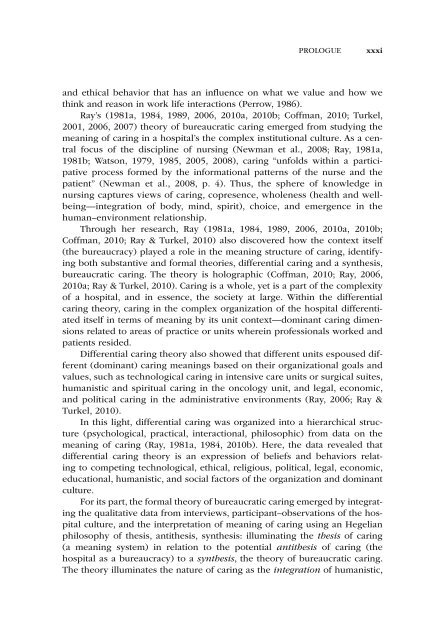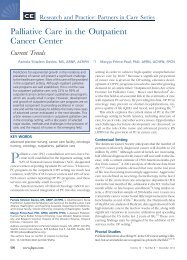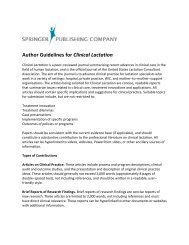Nursing, Caring, and Complexity Science: For Human ... - Axon
Nursing, Caring, and Complexity Science: For Human ... - Axon
Nursing, Caring, and Complexity Science: For Human ... - Axon
You also want an ePaper? Increase the reach of your titles
YUMPU automatically turns print PDFs into web optimized ePapers that Google loves.
PROLOGUE xxxi<br />
<strong>and</strong> ethical behavior that has an influence on what we value <strong>and</strong> how we<br />
think <strong>and</strong> reason in work life interactions (Perrow, 1986).<br />
Ray’s (1981a, 1984, 1989, 2006, 2010a, 2010b; Coffman, 2010; Turkel,<br />
2001, 2006, 2007) theory of bureaucratic caring emerged from studying the<br />
meaning of caring in a hospital’s the complex institutional culture. As a central<br />
focus of the discipline of nursing (Newman et al., 2008; Ray, 1981a,<br />
1981b; Watson, 1979, 1985, 2005, 2008), caring “unfolds within a participative<br />
process formed by the informational patterns of the nurse <strong>and</strong> the<br />
patient” (Newman et al., 2008, p. 4). Thus, the sphere of knowledge in<br />
nursing captures views of caring, copresence, wholeness (health <strong>and</strong> wellbeing—integration<br />
of body, mind, spirit), choice, <strong>and</strong> emergence in the<br />
human–environment relationship.<br />
Through her research, Ray (1981a, 1984, 1989, 2006, 2010a, 2010b;<br />
Coffman, 2010; Ray & Turkel, 2010) also discovered how the context itself<br />
(the bureaucracy) played a role in the meaning structure of caring, identifying<br />
both substantive <strong>and</strong> formal theories, differential caring <strong>and</strong> a synthesis,<br />
bureaucratic caring. The theory is holographic (Coffman, 2010; Ray, 2006,<br />
2010a; Ray & Turkel, 2010). <strong>Caring</strong> is a whole, yet is a part of the complexity<br />
of a hospital, <strong>and</strong> in essence, the society at large. Within the differential<br />
caring theory, caring in the complex organization of the hospital differentiated<br />
itself in terms of meaning by its unit context—dominant caring dimensions<br />
related to areas of practice or units wherein professionals worked <strong>and</strong><br />
patients resided.<br />
Differential caring theory also showed that different units espoused different<br />
(dominant) caring meanings based on their organizational goals <strong>and</strong><br />
values, such as technological caring in intensive care units or surgical suites,<br />
humanistic <strong>and</strong> spiritual caring in the oncology unit, <strong>and</strong> legal, economic,<br />
<strong>and</strong> political caring in the administrative environments (Ray, 2006; Ray &<br />
Turkel, 2010).<br />
In this light, differential caring was organized into a hierarchical structure<br />
(psychological, practical, interactional, philosophic) from data on the<br />
meaning of caring (Ray, 1981a, 1984, 2010b). Here, the data revealed that<br />
differential caring theory is an expression of beliefs <strong>and</strong> behaviors relating<br />
to competing technological, ethical, religious, political, legal, economic,<br />
educational, humanistic, <strong>and</strong> social factors of the organization <strong>and</strong> dominant<br />
culture.<br />
<strong>For</strong> its part, the formal theory of bureaucratic caring emerged by integrating<br />
the qualitative data from interviews, participant–observations of the hospital<br />
culture, <strong>and</strong> the interpretation of meaning of caring using an Hegelian<br />
philosophy of thesis, antithesis, synthesis: illuminating the thesis of caring<br />
(a meaning system) in relation to the potential antithesis of caring (the<br />
hospital as a bureaucracy) to a synthesis, the theory of bureaucratic caring.<br />
The theory illuminates the nature of caring as the integration of humanistic,
















